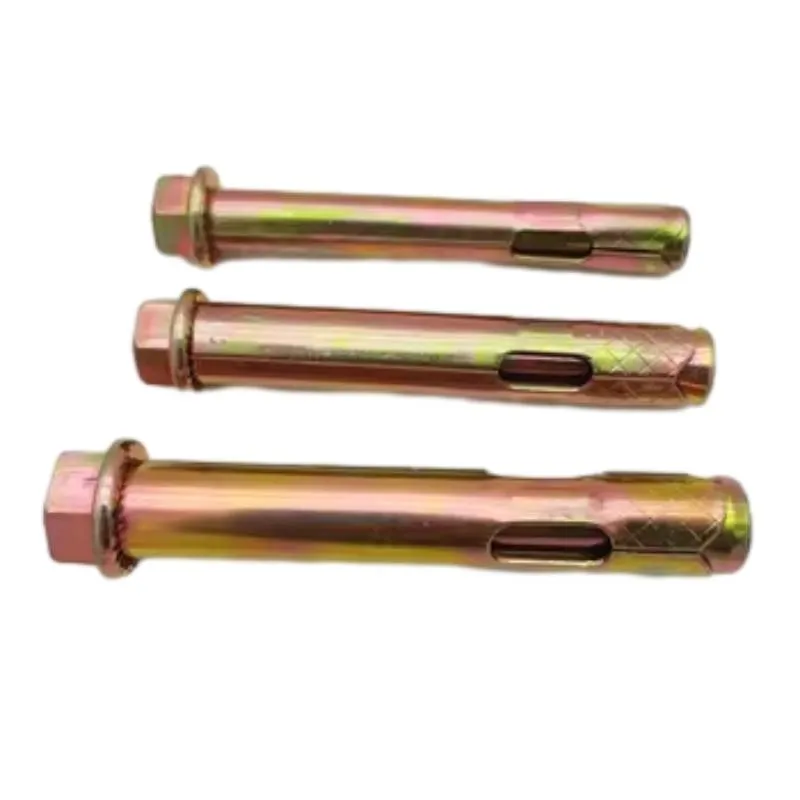Nov . 08, 2024 12:46 Back to list
Effective Applications and Techniques for Sleeve Anchor Installation and Usage
Understanding the Use of Sleeve Anchors in Construction
In the world of construction and engineering, the choice of fasteners plays a critical role in ensuring structural integrity and safety. Among the various types of anchors available, sleeve anchors have gained significant popularity due to their reliability and versatility. This article explores the uses, advantages, and installation processes of sleeve anchors, highlighting why they are a preferred choice in many construction projects.
What are Sleeve Anchors?
Sleeve anchors are a type of expansion anchor designed for securing objects to solid masonry or concrete. They consist of a threaded bolt, a cylindrical sleeve, and a cone-shaped insert that expands when the bolt is tightened. This design allows the sleeve anchor to achieve a strong grip on the base material, making it suitable for a variety of applications.
Applications of Sleeve Anchors
One of the primary advantages of sleeve anchors is their wide range of applications. They can be used in various settings, including
1. Structural Supports Sleeve anchors are often employed to secure structural components like beams, columns, and framework to concrete or masonry bases. Their robust holding strength makes them ideal for heavy-duty applications.
2. Equipment Installation In industrial settings, sleeve anchors are utilized to attach machinery and heavy equipment to floors and walls, ensuring stability and reducing the risk of movement during operation.
3. Architectural Features For non-structural applications, sleeve anchors can be used to install architectural elements such as handrails, signage, and decorative features. Their discreet design allows for a clean finish without compromising strength.
4. Outdoor Installations Sleeve anchors are also suitable for outdoor use, particularly in securing baseplates for fences, gates, and light poles. Their resistance to weather elements and corrosion makes them ideal for these applications.
Advantages of Sleeve Anchors
Sleeve anchors come with several benefits that contribute to their popularity in construction
- High Load Capacity Sleeve anchors can support heavy loads, making them suitable for various applications without the worry of failure or collapse.
sleeve anchor use

- Easy Installation The installation process for sleeve anchors is straightforward, requiring only simple tools. This ease of use significantly reduces labor time and costs on construction sites.
- Versatility Sleeve anchors can be used in different base materials, including brick, concrete, and hollow masonry, making them a go-to choice for many projects
.- Adjustability After installation, sleeve anchors can be adjusted to some extent, allowing for realignment of mounted objects if necessary.
Installation Process
Installing sleeve anchors involves several steps to ensure a secure fit. Here’s a simplified overview of the process
1. Preparation Identify the location for the anchor and ensure that the base material is clean and free of debris. Mark the drilling points.
2. Drilling Using a hammer drill and a bit sized for the sleeve anchor, drill a hole into the base material to the recommended depth.
3. Inserting the Anchor Insert the sleeve anchor into the hole, ensuring that the sleeve is flush with the surface.
4. Tightening Use a wrench to tighten the nut on the threaded bolt. As the bolt is tightened, the cone-shaped insert expands the sleeve against the wall of the hole, creating a secure grip.
5. Final Check After installation, check for stability by applying a firm pull on the mounted object. Ensure there is no movement and that the anchor is firmly in place.
Conclusion
Sleeve anchors are an essential tool in construction, providing strength, versatility, and ease of use across a multitude of applications. Whether securing structural supports or installing equipment, sleeve anchors offer reliable performance that withstands the demands of various environments. By understanding their benefits and proper installation techniques, professionals can enhance the durability and safety of their projects, making sleeve anchors a wise choice for construction needs.


